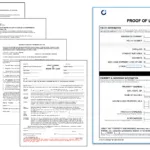Filing a claim under your property insurance policy, and following it through to conclusion can be difficult and frustrating. Filing a property insurance claim is a rare occurrence, and the insurance claim process is subject to many rules, regulations, and deadlines.The good news about these regulations, though, is that they provide protection to policyholders and are formed to make the claims process fair, efficient, and fast.
These resources are built to help policyholders, and the stakeholders who work with them, understand the requirements of making and settling a property insurance claim, and provide information to help streamline the claims process, and make it fair and fast.
Filing Deadline
Promptly
In New York, the deadline for informing the insurer of a claim is set forth by the policy itself. The standard New York policy requires “immediate” notification, so it is best to provide notice of the claim as soon as it is safe and reasonable to do so.
Initial Response Time
15 business days
Once an insurer receives a notification of claim (see above), they are required to acknowledge the claim within 15 business days.
Claim Decision Time
15 business days
New York generally requires that the insurer must accept or deny the claim in whole or part within 15 business days of receipt of a sufficient proof of loss document (plus all other items, statements, and/or forms required by the insurer). Note, however, that this deadline can be extended indefinitely if written communication of the reasons more time is needed is provided.
Lawsuit Deadline
6 Years Unless Set by Policy
While the general deadline to file suit for a breach of contract in New York (including an insurance contract) is 6 years from the date the insurer denied the claim, New York allows parties to a contract to agree in writing to shorten that deadline.
State Department
New York Department of Insurance
(800) 342-3736
New York State Department of Financial Services
1 State Street
New York, NY 10004-1511
New York Dept. of Financial Services website
File your Claim Now with ClaimSpot
ClaimSpot guides you through a quick, secure, and effortless filing experience.
It’s free. Let ClaimSpot Make Your Claim Fast & Easy.
New York Insurance Claim Guide
New York Insurance Frequently Asked Questions
These resources are specifically built to help policy holders, as well as the stakeholders that they work with. Below, you can find information that you can use to help make sure your claim is handled correctly from beginning to end, and learn the deadlines that you and your insurance company need to follow in order to ensure that your claim is processed smoothly, quickly, and efficiently. And, if necessary, how and when to escalate your claim and get paid.
In order to initiate a claim under a property insurance policy in New York, the policyholder must inform their insurance carrier of the loss, and that they are making a claim. This means that the only requirement to initiate the process is that the insurance carrier is told (either directly or through their insurance agent) that there has been a loss, some details about the loss, and that the policyholder wants to make a claim.
In many cases, an insurance company will call this communication a first notice of loss, or FNOL. In New York insurance law, this type of initial communication is called a “notice of claim” or “notification of a claim”.
While it can help to be as detailed as possible in the first communication with the insurer or agent, New York law defines notice of claim as “any notification, whether in writing or otherwise, to an insurer or its agent, by any claimant who reasonably apprises the insurer of the facts pertinent to a claim.”
Most insurance companies provide multiple ways to contact them after a loss to begin the claims process, these usually include:
1) Phone call (a number is usually provided on the insurance company’s website);
2) Online portal – many insurance companies have an online form to notify the claims department of a loss, this may even be through a mobile app;
3) Your agent – many insurance companies even have a different section of their website or phone number for an agent to inform them of a policy-holder’s loss; special note, however, NY law states that: “notice to an agent of an insurer shall not be notice to the insurer if such agent notifies the claimant that the agent is not authorized to receive notices of claims”
4) Online software as a virtual assistant.
While it is easy and quick to start a claim, claimants need to continue to follow-up and provide more information. In many cases, the insurer will require more information and supporting documentation, including specific forms, to actually process and adjust the claim.
Some things are pretty much universally the best practice after your property suffers damage. Whenever property damage occurs, and it looks like a claim under the insurance will be necessary, the insured should take steps to help ensure the claim processing will go smoothly. These steps include:
1) Mitigate the damage, as soon as it is reasonable. This means protect the property and secure it against further damage when it is safe and possible to do so. Mitigation should only be just trying to keep the damage from getting worse, it does not mean that it is a good idea to jump directly into substantive repairs.
2) Inform the insurance carrier of the damage.
3) Determine if the covered damage exceeds the policy deductible by an amount sufficient to make a claim.
4) Cooperate with your insurance company, inspectors/adjusters, and other interested parties and communicate with them (and keep copies of all correspondence).
5) Make your property available for inspection as soon as it is safe and possible to do so.
6) Prepare supporting documents for your claim including:
a) Inventory list;
b) Description of damages;
c) Photographs and/or videos of the damage;
d) Receipts; etc.
Reporting Deadline: New York insurance law does not have a specific provision setting forth a universally applicable deadline for making a property insurance claim. This means that the deadline for informing the insurer of a claim is set forth by the policy itself. It is important to be familiar with the insurance policy so that deadlines are not missed.
The “New York standard policy” for property insurance, requires the policyholder to give “immediate written notice” to the insurer of any covered loss for which a claim is being made. While it is never a good idea to delay in providing the insurance company with information once it has been determined that a claim will be filed, the actual meaning of “immediate” or “prompt” or “reasonable” with respect to making a claim depends on the circumstances – if a home is completely destroyed by a storm and the phones, internet, and power are off, it may take a little longer to make the claim.
Be sure to check the language of the insurance policy to determine the notification or reporting deadlines. But, in any event, remember that best practice is to provide notice of the loss and claim to the insurer as soon as possible.
Documentation Deadline: Similarly to the deadline by which a policyholder must make a claim, the deadline to provide supporting documents or other documentation or evidence is not set by New York statute, but instead by the policy itself. Many New York insurance policies require that a proof of loss document be provided within 60 days, as that is the shortest time period allowed. In any event, however, the deadline for submitting a proof of loss can be extended by agreement between the parties if circumstances make it difficult or impossible for the policyholder to comply with the 60-day deadline.
Note, however, that no matter the actual deadline for providing supporting documentation, it is always best practice to provide a proof of loss document and support of the claim as soon as possible (while noting that the document only presents the knowledge at the time and may be amended or updated). Some deadlines for New York insurance companies start to run from receipt of a sufficient proof of loss (in connection with any other items or requested forms), so getting one to the insurance company quickly is a good way to get the claim process moving along, and to get your payment.
Deadlines for Acknowledgment: New York has adopted laws governing unfair claims settlement practices to protect policyholders and to provide a streamlined timeline for claims to be handled.
Once an insurer receives a notification of claim (see above), they are required to acknowledge the claim within 15 business days.
Deadlines for Investigation: New York insurers are also required to begin any investigation of the claim (if any such investigation is required) within the same 15-business-day period after receiving the notice of claim.
Additionally, within the same 15-day period, the insurer is also required to provide the claimant with “a notification of all items, statements and forms, if any, which the insurer reasonably believes will be required of the claimant.”
Deadline for Acceptance/Denial: New York generally requires that the insurer must accept or deny the claim in whole or part within 15 business days of receipt of a sufficient proof of loss document (plus all other items, statements, and/or forms required by the insurer). This time period can be extended, but only if the insurer provides the policyholder with written reasons for the delay within the initial 15-business-day period. If the claim remains open, the insurer is also required to provide the claimant a letter within 90 days from the initial communication saying more time was needed to investigate, and again every 90 days thereafter, stating the reasons additional time is needed, as long as the claim remains open.
Deadline for Payment: New York generally requires that any approved portion of a claim must be paid within 5 days of the claim determination (or within 5 days of when the claimant performs any condition set by the agreement).
If an insurance company is determined to be in violation of the unfair claims settlement practices requirements, the insurer is subject to penalties for each instance of noncompliance.
Additionally, depending on the actions of the insurance company, a policyholder may be able to make a claim against the insurer for bad faith.
Deadlines to File Suit: Absent a provision in the policy shortening the period, the general deadline to file suit for a breach of contract in New York (including an insurance contract) is 6 years from the date the insurer denied the claim. However, New York allows parties to a contract to agree in writing to shorten that deadline. This generally occurs in insurance policies.
Additionally, while the deadline generally begins to run from the date the claim occurred (when the claim is denied), New York also allows parties to include language in the insurance policy that starts the clock on the date of the underlying loss, rather than the date the claim is denied.












